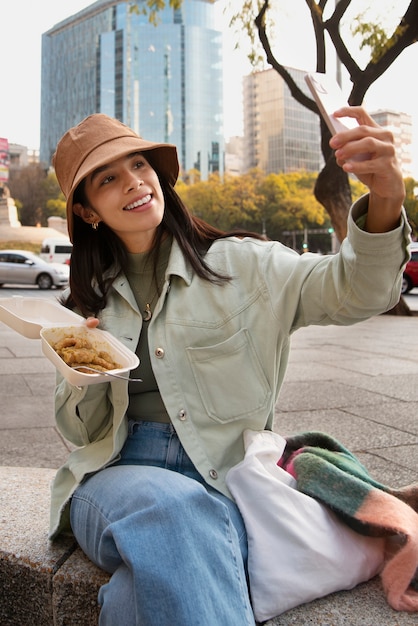
**Why Travelers Need to Be Extra Careful About What They Eat and Drink**
Traveler’s illness is more common than you might think, and it can cost you more than just money—it can ruin your trip or even lead to serious health problems. Whether you’re exploring the vibrant streets of Mumbai or indulging in the flavors of Mexico City, you’re at risk if you’re not mindful of what you eat and drink. Food poisoning is a frequent culprit, and while trying local cuisine is part of the adventure, it’s crucial to find a balance between enjoying new flavors and keeping your stomach safe.
The food you eat at home may not bother you because your stomach is used to it, but traveling exposes you to unfamiliar ingredients, different preparation methods, and potential bacteria from natural fertilizers. Many cases of traveler’s “tummy troubles” stem from unsafe foods or drinks, often caused by pathogens like E. coli, salmonella, or norovirus. Before traveling, it’s wise to check online resources like those from the World Health Organization (WHO) or the Centers for Disease Control and Prevention (CDC) to familiarize yourself with common foodborne illnesses in your destination.
To minimize risk, stick to food you can cook, wash, or peel yourself. Foods like raw vegetables, cold meats, seafood, and unpasteurized dairy products are common sources of infection. Make sure cooked food is served hot, and avoid anything that seems partially cooked. Be wary of beverages made with contaminated milk or water, and always check expiration dates on packaged items.
**Street Food Safety**
Street food is often tempting, but it can carry risks if it hasn’t been prepared hygienically. Always choose hot, freshly cooked dishes from vendors with a high turnover of customers—this indicates fresher food. Avoid poorly maintained stalls or those with unsanitary conditions. And don’t forget to wash your hands thoroughly before eating, using clean water if possible.
**Maintaining a Balanced Diet**
Eating well while traveling is important, especially for pregnant women, the elderly, and those with weakened immune systems, who are more vulnerable to sickness. Even healthy individuals can suffer the consequences of an unbalanced or inadequate diet during travel. If you’re unsure about the safety of certain types of meat, you can get your protein from alternatives like eggs, tofu, nuts, or lentils. Peelable fruits like bananas or oranges are safer than berries or apples, which may carry bacteria. Stay hydrated by drinking bottled or boiled water, and consider energy bars or vitamin supplements to fill nutritional gaps.
**Foods and Drinks to Avoid When Traveling**
– **Frozen Items:** Ice cream and ice cubes might look harmless, but temperature variations during storage can allow bacteria to grow.
– **Raw or Semicooked Eggs:** Raw eggs and dishes containing them, like hollandaise sauce, can harbor salmonella.
– **Fresh Sauces:** Avoid condiments like salsa or chutneys made from raw ingredients unless you’re certain they’ve been prepared hygienically.
– **Fountain Sodas:** Stick to sealed beverages; fountain drinks and non-bottled water can be contaminated.
– **Undercooked Meat and Seafood:** Raw or improperly cooked seafood, shellfish, and meat can carry dangerous bacteria and parasites.
– **Raw Dairy:** Dairy products that aren’t pasteurized may contain harmful bacteria like listeria or E. coli.
– **Fragile Fruits:** Opt for fruits with thick peels (e.g., bananas or oranges) rather than delicate ones like strawberries, which are harder to clean.
– **Uncooked Vegetables:** Salads and raw veggies can carry pathogens, especially if they aren’t washed thoroughly in clean water.
– **Wild Game:** Avoid meat that hasn’t been inspected or properly cooked to ensure it’s bacteria-free.
– **Fresh Juice:** Even freshly squeezed juices can be risky if the fruits haven’t been washed with safe water or handled hygienically.
**How to Safely Enjoy Fruits and Vegetables**
Wash fruits thoroughly before peeling and eating them, and stay away from soft or overripe produce that might already be spoiled. Boiling vegetables destroys most harmful bacteria, so this is a safer choice than eating them raw. Skip fresh salads unless you’re at a reputable, hygienic restaurant.
**Safe Practices for Meat, Fish, Eggs, and Dairy**
Always ensure your meat and fish are fully cooked, and avoid ordering these dishes at questionable eateries, where food might not be stored or prepared properly. Stick to pasteurized dairy products from well-known supermarkets and boil any unpasteurized milk before consuming it. Seafood, in particular, requires extra caution, as it can spoil easily.
**Drinking Safely While Traveling**
If you don’t have access to bottled water with a secure seal, boil tap water before drinking it. Hot beverages like tea and coffee are generally safe, but avoid cold beverages that might contain ice or tap water. Be alert to counterfeit bottled water in certain countries. Canned drinks, as well as water treated with purification tablets, are usually safe.
**Other Helpful Tips**
Always order food and drinks from clean-looking venues, and check whether the food is served at the appropriate temperature—hot dishes should be piping hot, while cold desserts should feel properly chilled. Use a clean plate, wipe the rims of any glasses, and avoid experimenting with street food unless you’re confident in the vendor’s hygiene practices. For ultimate safety, use boiled water even to brush your teeth.
**Conclusion**
Being adventurous with food is a great way to explore new cultures, but it’s important to prioritize your health while traveling. By following these food and drink safety tips, you can reduce the risk of illnesses, allowing you to enjoy your trip worry-free. Remember, when in doubt, it’s always better to be cautious than regretful.